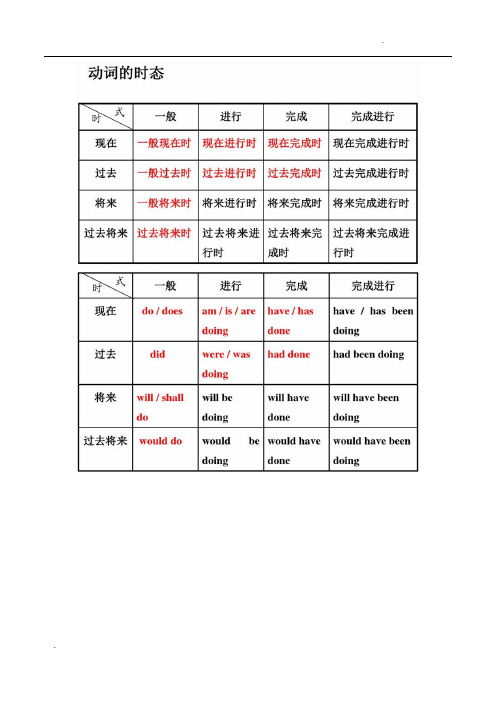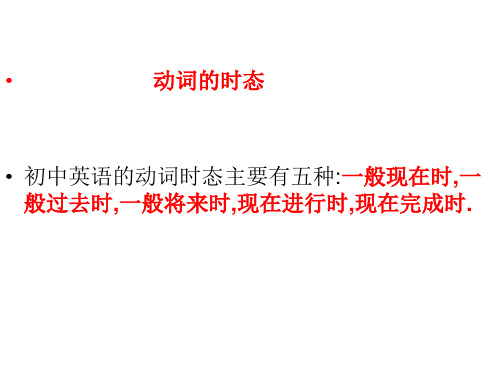1一般现在时
高中总复习二轮英语 核心语法必备 专题一 谓语动词(动词的时态、语态、主谓一致、情态动词和虚拟语气)

必
备
专题一 谓语动词(动词的时态、语态、 主谓一致、情态动词和虚拟语气)
英语
内容索引
要点精讲•破疑解难 对点演练•精准提升
要点精讲•破疑解难
重点一 热考的5种时态
考点1 一般现在时(am/is/are或do/does)
用法
例句
表示现在经常性、习惯性、 反复性的动作或状态
Susan talks every night in her dream. It
代词
单个的动词-ing形式、动词不定式或主语从句
重点一
重点二
重点三
重点四
原则
主语
谓语
由and连接的两个并列成分表示两个不同的概念
有生命的集体名词, 如people, police, cattle等 一些常用作复数或只有复数形式的名词, 如goods,
stairs,
arms等
复数
山脉、群岛、瀑布等以-s结尾的专有名词
重点一
重点二
重点三
重点四
提示 用过去完成时的常用句型: ①This/That/It was the first/second/... time+that 从句, 从句用过去完成时。 ② “Hardly/Scarcely had+主语+动词过去分词... when...” 及 “No sooner had+主语+动词过去分词... than...”, 主句用过去完成时, 从句用一般过去时。
By the time Jack returned home from
表示一个动作或状态从过去 England, his son had graduated from 某一时间之前已经开始, 一直 college. 持续到过去这一时刻的动作 杰克从英国回到家中时, 他的儿子已经大
英语16种时态超经典整理

英语的16种时态1.一般现在时the present tense2.一般过去时the past tense3.一般将来时the future tense4.一般过去将来时the past future tense5.现在进行时the present continuous tense6.过去进行时the past Continuous Tense7.将来进行时the future continuous tense8.过去将来进行时the past future continuous tense9.现在完成时the Present Perfect Tense10.过去完成时the Past Perfect Tense11.将来完成时the future perfect tense12.过去将来完成时the past future perfect tense13.现在完成进行时the present perfect continuous tense14.过去完成进行时the past perfect continuous tense15.将来完成进行时the future perfect continuous tense16.过去将来完成进行时the past future perfect continuous tense1、一般现在时(1)一般现在时表示没有时限的持久存在的动作或状态或现阶段反复发生的动作或状态,常和副词usually,often,always sometimes,regularly,near,occasionally,every year, every week 等连用。
例如:1)The moon moves round the earth..2)Mr. Smith travels to work by bus every day.(2)在由after,until,before,once,when,even if,in case,as long as,as soon as,the moment 以及if,unless 等引导的时间状语从句或条件状语从句中,通常用一般现在时代替将来时。
三种时态

1、一般现在时。
表示通常性、规律性、习惯性、真理性的状态或者动作(有时间规律发生的事件)的一种时间状态。
次超市或新华书店等。
规律性:在生活中,有的事情是有规律的,有的是偶尔做几次。
这些都算经常发生的事件。
习惯性:这个动作经常发生,是一般的情况而不是具体的某一次。
真理性:有些动作或状态是永恒的,比如长江向东流、地球绕着太阳转,比如谚语中举的事例、文学作品中描绘的事例,像“好马不吃回头草”等等。
The earth moves around the sun.地球绕着太阳转。
Shanghai lies in the east of China.上海市在中国的东部。
现在进行时表示正在进行的动作或存在的状态。
现在进行时表示动作发生的时间是“现在”,动作目前的状态是“正在进行中”。
所谓“正在进行中”,是指在谈到这件事的时候,这个动作还在进行中。
1·说话·写文章的当刻正在发生的动作2·现阶段一直在进行的动作。
1、现在进行时的构成是:主语+be动词(am /is /are)+动词ing形式〔现在分词〕肯定句:主语+be动词(am /is /are)+动词ing+其他。
否定句:主语+be动词(am /is /are)+not+动词ing+其他。
一般疑问句:Be动词+主语+动词ing+其他。
特殊疑问句:特殊疑问词+一般疑问句肯定回答:Yes,主语+be动词(am /is /are)。
否定回答:No,主语+be动词(am /is /are)+not。
2、可用来表示现在进行时的时间状语,常用的有:now,this week,at the moment,right now 等;或者告诉你一个准确的现在时间,或者用look,listen(常用于句子的开头,表示提醒听者注意正在发生的事情)。
例如:◇They are playing basketball now.现在,他们正在打篮球。
◇Listen,She is singing an English song.听,她正在唱英文歌。
英语六大时态

六大时态
一、一般现在时
1.含义:经常性,习惯性
客观规律现象
2.结构:主语(第一人称、第二人称、第三人称复数)+动原
主语(第三人称单数)+单三
3.标志词:often,always,sometimes,seldom,hardly,every
一般过去时
1.含义:在过去的某一时间或存在的状态
2.结构:主语+单三
3.标志词:yesterday,last,in the past,ago,just now,in+过去时间
现在进行时
1含义:现在的某一时刻正在发生的动作或现在某一段时间内存在的状态
2.结构:be(am/is/are)+doing
3.标志词:look,listen,now
过去进行时
1含义:过去的某一时刻正在发生的动作或过去某一段时间内存在的状态
2.结构:be(was/were)+doing
3.标志词:at this/that time yesterday
一般将来时
1.含义:在将来的某一时间将要发生的动作或存在的状态
2.结构:will+do
am/is/are going to+do
3.标志词:tomorrow,next,in the future,in+将来时间(段时间)
六、现在完成时
1.含义:发生在过去的动作对现在造成的影响或结果
发生在过去的动作延续到现在或者有可能继续延续下去(这时的谓语动词必须是延续的)
2.结构:助动词have/had+过去分词
3.标志词:already,yet,since for,just,never,ever,次数,
In/during+the past/last+时间。
八大时态讲解(共26张PPT)

0 一般过去将来时:
He was sixty-eight. In two years he would be seventy.
I knew you would agree.
0 现在英进行语时的: 动词时态(进行) What are you doing?
算;
如:I am going to listen to music. (我打算听音乐) will /shall 表示未事先思考或为计划过的意图
如:It will be Christmas soon .(很快就圣诞节了)
4. 现在进行时态( The Present Continuous Tense )
5、我们离开广州六年了。
We have left Guangzhou for 6 years . ×
We have been away from Guangzhou for 6
years .
3.常见句型
1) 主句(现在完成时)+since 从句(一般过去时).
2) It is +一段时间+ since 从句(一般过去时).
has gone to
He said had seen this morning, …ago, etc
that he _________the film many 如果明天不下雨,我们将去野营。
He has borrowed the pen for three days .
times. 现在进行时态( The Present Continuous Tense )
was /were going to +动词原形
小升初英语讲解时态:一般现在

小升初英语总复习精讲精练之动词时态(1) 一般现在时【精讲】前段时间,我们梳理了小升初英语常考的词法,从今天开始,我们一起看看小升初英语常考的时态。
今天先来复习第一部分:一般现在时。
一般现在时,表示通畅性、规律性、习惯性的动作或状态。
那么在考试中怎样判断句子中应该用什么时态呢?首先我们一起看看一般现在时的关键词。
[关键词]always(总是), often(经常), usually(通常), sometimes(有时), never(从不), every day(每天)/ week(每周)/ month(每个月)/ year(每年), once/ twice/ three times a day / week / month / year(每天/每周/每月/每年一次/两次/三次......)。
如果句子中出现以上关键词,那么这个句子要用一般现在时。
那么一般现在时又有哪些人称之分呢?[人称]1、单三人称:he, she, it以及所有能够用he,she,it所代替的人称。
2、非单三人称:除单三人称以外其他的人称。
为什么在一般现在时中,我们要把人称分为以上两种呢?这也是小升初考试的一个考点,即:在一般现在时中,主语如果是单三人称,谓语动词要在词尾+s或es(动词单三人称的变化规则同名词单数变复数),主语如果是其他人称,谓语动词用原形。
[构成形式]一般现在时的构成形式分为两种:一种是含有be动词,另一种是含有实意动词。
我们一起通过下面两个表格看看这两种形式有什么区别:我们一起看看下面几个例句:1、I drink milk every day. 我每天都喝牛奶。
2、He likes playing tennis.他喜欢打网球。
3、I don’t speak French.我不讲法语。
4、Where is my skirt ?我的裙子在哪里?5、Does he get up early every morning? 他每天都起床很早吗?【精练】一、用括号内所给动词的适当形式填空。
五种时态一般现在时的_一般过去式_现在进行_现在完成时_一般将来时

• 2现在进行时:
• 构成:句子的结构如下: be am is +动词的“-ing”形式 are 标志性时间now • 用法 • A,主要表示现在或现阶段正在进行的动作。如: 1. I am listening to the music now. 2. The students are drawing pictures now. 3. Listen! She is singing . 4. Look! Mr Li is riding a bike. B,有些动词的现在进行时表示近期按计划或安排要进行 的动作。这些动词是:go ,come, leave ,start ,arrive , return ,work sleep,stay,play,do,have ,wear….. She is coming to see me tomorrow.
_______________________________________________ _
• 3. 一般将来时:
• 构成: will/shall+动词原形——表示将来发生 的动作或将来存在的状态 表示一种倾向或一种固有特性 或经常发生的动作 be going to+动词原形——标识即将发生的或最近打算进 行的事标志性时间: tomorrow, next month, in two days, It won’t rain tonight . I shall meet you at the station. • 适应情况:主要表示将要发生的动作或情况。 He is going to have a swim tomorrow. • 特殊情况:有些动词如go,come,leave,arrive, start,move等位置移动词可用现在进行时表示将要发生 的动作。
1 一般现在时的概念

1.概念:一般现在时表示经常的、习惯性的动作或存在的状态。
2. 一般现在时的构成一般现在时的构成主要有两种形式:(1)be型:句子的谓语动词只有be(am,is或are):a.肯定句中,只出现be,如: I am astudent.我是一名学生。
b.否定句中,要在be后面加not,如:She isn't a teacher.她不是教师。
c.一般疑问句,要将be放在句子开头(注意句首字母大写),句尾用问号,答语用Yes,主语+be.或No,主语+be+not.如:—Areyou ready?—你准备好了吗? —Yes,Iam.—是的,我准备好了。
(—No,I'm not.—不,我没准备好。
)(2)实义动词型:句中的谓语动词为实义动词(也叫行为动词):a.肯定句中,只出现实义动词,如:I getupin themorning.我早晨起床。
b.否定句中,要在实义动词前面加do(does)+not,do(does)作助动词,本身无意义,常与not缩写成don't(doesn't),如:I don't like vegetables.我不喜欢蔬菜。
c.一般疑问句,要在句子开头加助动词Do(does),句尾用问号,简略答语用Yes,主语+do(does).或No,主语+do(does)+not.如:—Doyoulike oranges?—你喜欢桔子吗?—Yes,I do.—是的,我喜欢。
(—No,Idon't.—不,我不喜欢。
)3.一般现在时的用法1) 经常性或习惯性的动作,常与表示频度的时间状语连用,如:every…, sometimes, at…, onSunday等。
I leave homefor school at7every morning. 我每天早上7点去上学。
2) 客观真理,客观存在,科学事实。
The earth moves aroundthe sun.地球绕着太阳。
- 1、下载文档前请自行甄别文档内容的完整性,平台不提供额外的编辑、内容补充、找答案等附加服务。
- 2、"仅部分预览"的文档,不可在线预览部分如存在完整性等问题,可反馈申请退款(可完整预览的文档不适用该条件!)。
- 3、如文档侵犯您的权益,请联系客服反馈,我们会尽快为您处理(人工客服工作时间:9:00-18:30)。
Ⅱ。句型转换 1、Some people think he is cool.(改为否定句) Some people ______ ______ ______ ______ cool. 2、This pop singer has a new look.(改为一般疑问句) ______ this pop singer ______ a new look? 3、She wears funny glasses.(改为否定句) She ______ ______ funny glasses. Ⅲ.用所给词的适当形式填空 1、Little Tom can ______ (ride) a horse. 2、Lily with her father ______ (plant) a tree in their garden. 3、Jack ______(have) medium build. 4、What ______ your father ______ (look) like? 5、He is very tired ,but he doesn’t ______ (stop) working. 6、Would you like ______ (have) a cup of tea? 7、That kind of cabbage ______ (be) very expensive. 8.What time ______ your parents______(get) up every morning? Ⅳ.单选 1、Do you know ______ your new manager(经理) looks like? A. what B. when C. that D. it 2、You ______ nervous(紧张). A. looks little B. like a little C. look a little D. look like 3、Sarah’s brother always ______ . A. puts a glasses B. wears a glasses C. put glasses D. wears glasses 4、I don’t think ______ cool. A. is he B. is his C. he is D. his is 5、My brother doesn’t like reading. But my sister ______. A. do B. does C. is D. reading 6、Our math teacher is medium ______ black curly hair. A. high at B. tall in C. height of D. height with 7、—______ size bowl would you like? —Large. A. Why B. What C. Where D. When 8、I’d like some noodles. What ______ noodles would you like? A. kind B. size C. kind of D. size of 9、Willie would like ______ bread. A. a piece of B. a C. an D. piece of
大桥外语小学部 2010 暑期短训教学“一表通”
学生姓名: 教 师 王红玲
一般现在时
1) 经常性或习惯性的动作,常与表示频率的时间状语连用。 时间状语: every…, sometimes, always, on Sunday, often, usually, 。例如:I leave home for school at 7 every morning. 2) 客观真理,客观存在,科学事实。 例如: The earth moves around the sun. 地球绕太阳转动。 Shanghai lies in the east of China. 上海位于中国东部。 3) 表示格言或警句。例如: Pride goes before a fall. 骄者必败。 今 日 教 学 重 点 注意:此用法如果出现在宾语从句中,即使主句是过去时,从句谓语也要用一般现在时。 例:Columbus proved that the earth is round. 哥伦布证实了地球是圆的。 4) 现在时刻的状态、能力、性格、个性。 例如: I don't want so much. 我不要那么多。 Ann writes good English but does not speak well. 安英语写得不错,讲的可不行。 比较:Now I put the sugar in the cup. 把糖放入杯子。 I am doing my homework now. 我正在做功课。 第一句用一般现在时,用于操作演示或指导说明的示范性动作,表示言行的瞬间动作。第二句中的 now 是进行时的标志, 表示正在进行的动作的客观状况,所以后句用现在进行时. 助动词:do / does 动词变单三的规则:1) 一般词尾加 s like-likes; watch-watches do-does study —— studies play-plays 2)s,x,sh,ch, o 在词尾,直接加 es 3)辅音+y 结尾的,变 y 为 i 加 es 4)元音+y 结尾的,在词尾加 s 特例:have-has are/am-is
课堂测试
Ⅰ.写出下列动词的单三形式 1. drive ______ 6. have ______ 11. wash _______ 16. try _______ e ________ 7. come _______ 12. fly _______ 17. enjoy ______ 3. carry _______ 8. go ________ 13. say _______ 18. use _______
上课时间:8:00-10:00
班型: 八上语法精华班 日期: 7 月 13 日
Hale Waihona Puke 今 日 作 业( ) 1 -_____ they often ___ these old men? -Yes, they___. A. Do; help; are B.Are; helping; are C. Do; help; do D. Are; helped; are ( ) 2 Ann ____ her hair every week. A. is going to wash B. wash C. washes D. is washing ( ) 3 They usually _____ TV in the evening. A. watch B. will watch C. are watching D. watches ( ) 4 The sun ___ in the east and___ in the west. A. raises; set B. rise; sets C. rises; sets D. rises; set ( ) 5 Miss Gao___ English on the radio every morning. A. had studied B. studies C. study D. studied ( ) 6 -I usually have milk and bread for breakfast. What about you, Jim? -So do I, but my sister ___. A. hasn't B. doesn't C. didn't D. won't ( ) 7. She will go if it ___ tomorrow. A. isn't rain B. don't rain C. doesn't rain D. didn't rain ( ) 8. -___ he ___ to work on foot? -Yes, he___. A. Do; go; do B. Does; go; does C. Is; going; does D. Does; go; is ( ) 9. _____ you ___ some speaking in English every day? A. Is; speaking B. Do; do C. Do; does D. Does; do ( ) 10 ___ you ___ to school every day? A. When; go B. When do; go C. When did; go D. Does; goes
成绩:________________
4. play________ 9. do _________ 14. pass ________ 19. catch _______
5.teach________ 10. be _________ 15. buy _________ 20. dress ______
